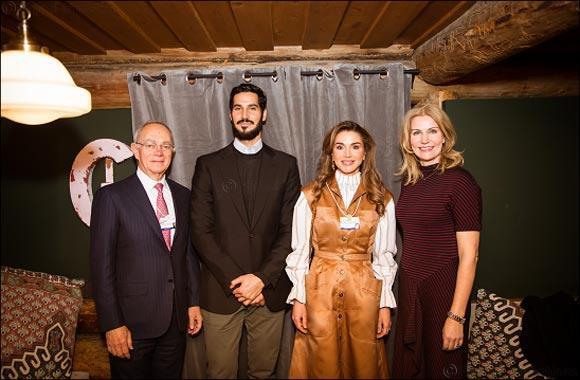
UAE- Leaders Commit to Urgent Support for Refugee Education
At the meeting, Hassan Jameel, President of Community Jameel Saudi Arabia, affirmed his commitment to transforming education across the Middle East, commenting: 'Every child deserves safe access to education - a critical tool for people to improve their lives and the lives of those around them. Through our partnership with Save the Children, we are committed to supporting teachers in Jordan deliver quality education in this extremely challenging environment, reaching over 700,000 people in the first five years and hopefully many more children across the region in the future.
Moderated by Tania Bryer of CNBC, the roundtable included leaders from the worlds of business, politics, philanthropy and civil society. Attendees included participants from the Islamic Development Bank, UNHCR, the Queen Rania Foundation, Dubai Cares, the Massachusetts Institute of Technology (MIT), Google.org, LEGO Foundation and GEMS Education.
Almost six million people have fled Syria since the crisis began in 2011, most of whom have remained in the Middle East. More than a million now reside in Jordan, putting considerable strain on the country and the education sector in particular.
In response, Save the Children and the MIT Abdul Latif Jameel World Education Lab (J-WEL), co-founded in 2017 by Community Jameel and MIT, have partnered to integrate social and emotional wellbeing into teacher professional development programmes in crisis settings. The programme, Transforming Refugee Education towards Excellence (TREE), was announced at a high-level meeting on education in emergencies at the 2018 United Nations General Assembly and launches this year, piloting in Jordan.
Save the Children's Invisible Wounds report the largest study of its kind conducted during the course of the Syria civil war revealed a terrifying mental health crisis among Syrian children. Children they spoke to described increases in self-harm, suicide attempts, bedwetting, speech problems and aggressive or withdrawn behaviour. Mental health experts have also warned that Syrian children are showing signs of ‘toxic stress', which can lead to developmental issues. Experts identified a return to education a key intervention to address this mental health crisis among Syrian children.

Legal Disclaimer:
MENAFN provides the
information “as is” without warranty of any kind. We do not accept
any responsibility or liability for the accuracy, content, images,
videos, licenses, completeness, legality, or reliability of the information
contained in this article. If you have any complaints or copyright
issues related to this article, kindly contact the provider above.


![[CES 2026] Inside Samsung’s The First Look 2026: A Vision of AI Compan...](/Updates/index/HTML_Images/NewsEN_MostPopular_img_1.png?1110566320)















Comments
No comment